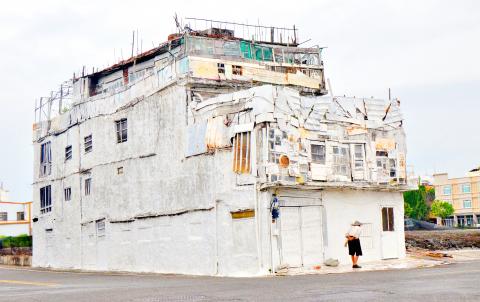An elderly man who maintains a house furnished with abandoned materials and painted white has stirred interest in Taitung County.
The man, surnamed Lee (李) and possibly in his 80s, has been collecting waste wood, bricks and glass to refurbish his house over the past 30 years, Taitung residents say.
Opinions differ as to what kind of person Lee is and what kind of house he is keeping because Lee, who is hearing-impaired and inarticulate, has never revealed his story.

Photo: CNA
Standing distinctively on an empty plot of land covering thousands of square meters, the house has become a tourist attraction.
Juan Wei-ming (阮偉明), an architect who is keeping a record of Lee and his house, said Lee was among the soldiers who withdrew with the Nationalist army to Taiwan after the Chinese Civil War.
Lee used to serve in the military in Tainan.
He raised six children, Juan said, adding that he has been invited into the house.
Juan said Lee told him that he spent NT$2 million (US$64,000) to buy the house in 1950, which Juan doubted.
The house is four floors, although it is hard to tell from the outside, Juan said, adding that Lee lives on the second floor and uses the third floor for growing vegetables.
Chen Chia-hsin (陳嘉信), one of Lee’s neighbors who walks by the house every day, said it was originally a military checkpoint.
Lee is a retired soldier who was left to guard the house, Chen said.
Regardless of the different versions of Lee’s story, what is for certain is that Lee’s unusual house continues to grow.
“He has been building this house all his life,” a woman who sells vegetables nearby said.

ANOTHER EMERGES: The CWA yesterday said this year’s fourth storm of the typhoon season had formed in the South China Sea, but was not expected to affect Taiwan Tropical Storm Gaemi has intensified slightly as it heads toward Taiwan, where it is expected to affect the country in the coming days, the Central Weather Administration (CWA) said yesterday. As of 8am yesterday, the 120km-radius storm was 800km southeast of Oluanpi (鵝鑾鼻), Taiwan’s southernmost tip, moving at 9kph northwest, the agency said. A sea warning for Gaemi could be issued tonight at the earliest, it said, adding that the storm is projected to be closest to Taiwan on Wednesday or Thursday. Gaemi’s potential effect on Taiwan remains unclear, as that would depend on its direction, radius and intensity, forecasters said. Former Weather Forecast

As COVID-19 cases in Japan have been increasing for 10 consecutive weeks, people should get vaccinated before visiting the nation, the Centers for Disease Control (CDC) said. The centers reported 773 hospitalizations and 124 deaths related to COVID-19 in Taiwan last week. CDC Epidemic Intelligence Center Director Guo Hung-wei (郭宏偉) on Tuesday said the number of weekly COVID-19 cases reported in Japan has been increasing since mid-May and surpassed 55,000 cases from July 8 to July 14. The average number of COVID-19 patients at Japan’s healthcare facilities that week was also 1.39 times that of the week before and KP.3 is the dominant

The Chinese Communist Party’s (CCP) working group for Taiwan-related policies is likely to be upgraded to a committee-level body, a report commissioned by the Mainland Affairs Council (MAC) said. As Chinese President Xi Jinping (習近平) is increasingly likely to upgrade the CCP’s Central Leading Group for Taiwan Affairs, Taiwanese authorities should prepare by researching Xi and the CCP, the report said. At the third plenary session of the 20th Central Committee of the CCP, which ended on Thursday last week, the party set a target of 2029 for the completion of some tasks, meaning that Xi is likely preparing to

US-CHINA TRADE DISPUTE: Despite Beijing’s offer of preferential treatment, the lure of China has dimmed as Taiwanese and international investors move out Japan and the US have become the favored destinations for Taiwanese graduates as China’s attraction has waned over the years, the Ministry of Labor said. According to the ministry’s latest income and employment advisory published this month, 3,215 Taiwanese university graduates from the class of 2020 went to Japan, surpassing for the first time the 2,881 graduates who went to China. A total of 2,300 graduates from the class of 2021 went to the US, compared with the 2,262 who went to China, the document showed. The trend continued for the class of 2023, of whom 1,460 went to Japan, 1,334 went to